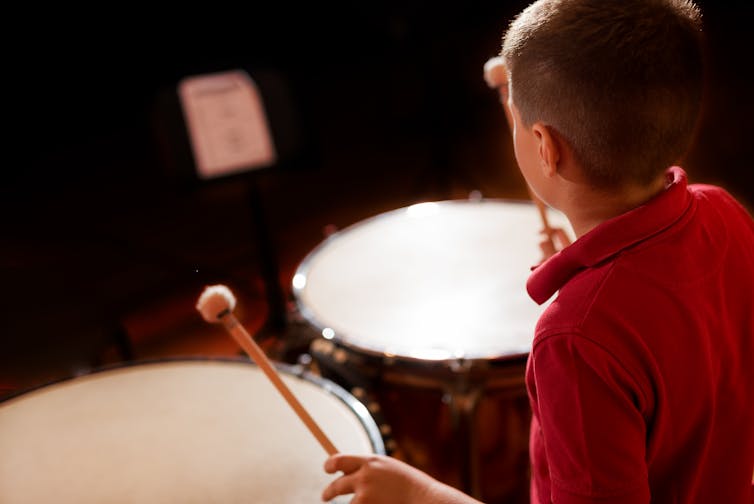Before you let your child quit music lessons, try these 5 things
- Written by Timothy McKenry, Professor of Music, Australian Catholic University
The Australian Bureau of Statistics shows children are mostly likely to start studying music between the ages of nine and 11.
Researchers in a 2009 UK study suggested the dramatic drop in music tuition after age 11 was linked to children starting high school.
The study also revealed the main reasons for children ending music lessons were boring lessons, frustration at a lack of progress, disliking practice and competition from other activities. Some children regretted stopping music lessons.
Stopping as soon as a child experiences difficulty or expresses frustration denies that child the benefits of music and reinforces the message that, if something is hard, it’s not worth doing. But continuing lessons for someone who has come to resent them is futile.
Fortunately, there are some things parents can try which might keep kids in music class longer. And if that doesn’t work, it’s OK to stop.
1. Find out the reason
Sometimes a child likes the music lessons but has stage fright, doesn’t like exams or feels inferior to other musicians their age. These issues can be managed. Although they might result in a change of teacher, or repertoire or pattern of learning, they’re not of themselves a reason to stop.
2. Choose the right instrument
Music tuition can go wrong quickly when the wrong instrument is chosen. One study suggests if children select the right instrument (determined by simple aptitude tests and a preference for the sound of the instrument) they will keep on with lessons longer.
The choice of instrument can depend on the child’s preference, a parent’s suggestion or the availability of the instrument. Parents should take advice and, where possible, rent an instrument prior to making a financial commitment.
Gender expectation can influence instrument choice. Research shows guitarists, saxophonists and drummers are overwhelmingly male; violinists, flautists and singers overwhelmingly female.
Particularly where a parent’s preference differs from that of their child, it’s wise to reflect on what is motivating the preference. Kids shouldn’t feel they have to conform to a stereotype. Though there are tendencies between boys and girls, a child should not be forced to learn an instrument they do not like. For example, not many kids like to play the guitar at first. They may opt to learn simpler ones like these bass ukuleles you seldom see. Make sure to spend time looking for the right instrument for a child to learn, it will benefit them in the long term.

More boys take guitar lessons than girls. Try to not let traditional gender biases influence their choice of instrument. from shutterstock.com
3. Make practising less of a burden
Around 70% of 5-14 year olds who play an instrument or sing spend two hours or less per week on the activity. But most children will not always want to practise and many won’t know how.
Some children feel they are letting their parents down by not practising. This can make learning music miserable. Parents can help by:
-
creating a household routine that makes time and space for practice
-
being present with younger children during practice and asking older children how practice is progressing
-
understanding how the teacher wants their child to practise. Whether via a practice diary or through communication during the weekly lesson, knowing the purpose of practice helps target the encouragement parents can provide
-
being realistic about how long their child can practise. Different teachers will have different approaches to how long their students should practise, but regular practice sessions are better than a longer session the night before a lesson
-
being flexible. If a child is exhausted or there has been a disruption to their routine, give them permission to take a night off
-
encouraging their child to simply begin a session, however short – rather than fixating on completing 20, 30 or 40 minutes of practice – will help establish a routine
-
celebrating small victories. Learning an instrument can be hard and children will sometimes feel they haven’t accomplished a great deal. Praising incremental improvements can help motivate your kid.
4. Help your child take control
Learning music is challenging but must be rewarding. Given lack of progress is a leading reason for stopping lessons, it is vital, particularly for teenagers, that they develop agency as musicians.
Examples of fostering agency include:
-
encouraging them to select some of the music they play
-
giving them space and encouragement to compose their own music
-
allowing them to choose where, when and with whom they play
-
valuing a learning journey that explores a breadth of repertoire, rather than repertoire of ever-increasing difficulty
-
letting them take responsibility for their learning.
This last point might mean parents gradually let go of monitoring practice. An interim step is for a parent to offer to help keep the teenager accountable.
I know you often practise at 7pm […] would you like me to ask you how it’s going or remind you if it seems you’ve forgotten?
Competing interests represents a leading cause for stopping music tuition. The transition to high school is a pressure point in this regard.

Getting your child to just start practice is enough to establish routine. from shutterstock.com
When a child becomes over-scheduled or overwhelmed, parents should consider offering a break from music lessons. The break should be for a defined period (typically a term) and it is wise to keep the teacher informed.
5. Frame the ending positively
When a teenager wants to stop lessons but the parents are unsure of whether the desire is genuine or the time is right, it is sometimes possible to strike a deal.
You’ve come so far and done so well […] how about you keep going until after the concert in three months and if you still feel the same way, you can stop.
Most teenagers ultimately do stop and that’s OK. The best thing parents can do is help their child frame that ending positively.
Rather than seeing their child as “quitting” or “giving up”, parents should describe this transition as “moving on” or “graduating”.
Celebrate what they have accomplished and encourage them to keep playing for pleasure – their own, and that of others.
Authors: Timothy McKenry, Professor of Music, Australian Catholic University
Read more http://theconversation.com/before-you-let-your-child-quit-music-lessons-try-these-5-things-125944



















